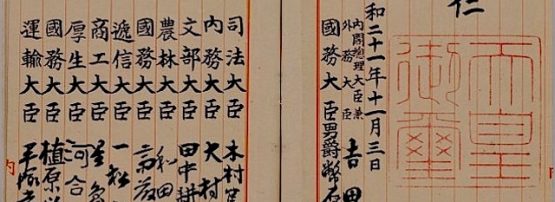
It’s well known that without reading the packet header, routers cannot forward packets.
In Japan, however, when an ISP’s router reads an IP header field to forward packets, it violates the Secrecy of Communications legislation. Although this necessary requirement of Internet communication is theoretically violating the law, at the same time, it does not seem to be illegal.
For those of you new to Japanese law, and the workings of the Internet in Japan, this all might sound funny. But this way of thinking, “violates the law, but seems not illegal” is very important when trying to understand how the Internet is managed in Japan.
Secrecy of Communications
The Japanese Constitution (Article 21) and the Telecommunications Business Act (Article 4) include “Preservation of Secrecy”. The difference between the Constitution and the law is the Constitution restricts the Japanese government, and the Telecommunications Business Act restricts the communications industry, including telecommunication carriers and ISPs.
The Secrecy of Communications section in the Constitution and the Telecommunications Business Act prohibit reading what is included in any communication. However, switches read frame headers to switch frames, and routers read IP headers to forward packets, therefore, they both theoretically violate the secrecy of communications.
Reading the IP header is required in the ordinary course of managing a router. It is required, so, it is a “reasonable act”. Therefore, reading header information on routers and switches are exempt from Secrecy of Communications.
The “interpretation” of the law
This, “violates the law, but seems not illegal” interpretation can be seen in many places in the management of the Internet in Japan.
It is used to justify various ISP operations, for example; bandwidth control (legitimate act), traffic classification (legitimate act), and child porn blocking (to prevent harm from exposure to content).
Some of the “interpretations” of the law are compiled as guidelines – some are made by the government, and some are made by the industry. The guidelines are created by groups of legal professionals, often endorsed by the ministries and agencies.
The guidelines do not guarantee the “interpretations”, rather they are a way of thinking; that the action is justified and seems not illegal.
To truly justify the “interpretations”, the court’s judgment is required; however, no one has been judged liable for this. Therefore, it is assumed that these “interpretations” are not illegal, and are treated as best current practice.
This way, by creating new ways of “interpretations”, a new way of network management is sometimes justified without changing or creating a new law.
Although the potential risks to be sued remain, new “interpretations” are often based on previous “interpretations”. This is why it is required to know not only the law itself, but the history of the “interpretations” as well.
“Routers and switches violate the Japanese law, but seems not illegal” is a very extreme example, but is a very common “interpretation” that illustrates the complex situation of the Internet in Japan.
I hope this article helps you to “interpret” Internet management in Japan!
Akimichi Ogawa is a Japanese blogger/writer. He writes about TCP/IP, Internet governance, Internet protocols, Internet infrastructure and Japan’s blogosphere.
The views expressed by the authors of this blog are their own and do not necessarily reflect the views of APNIC. Please note a Code of Conduct applies to this blog.
